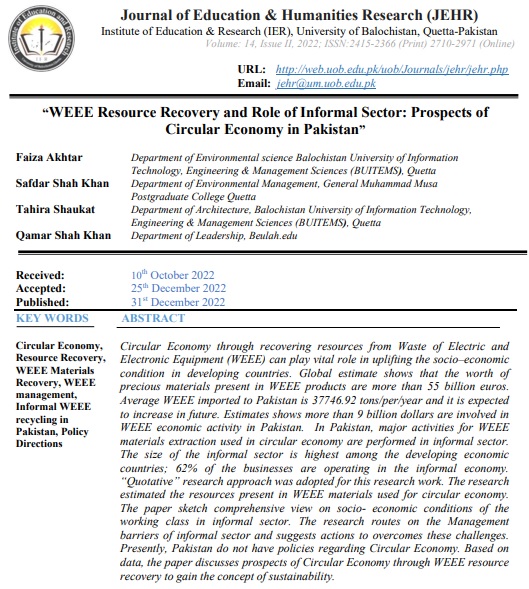WEEE Resource Recovery and Role of Informal Sector: Prospects of Circular Economy in Pakistan
Prospects of Circular Economy in Pakistan
Keywords:
Circular Economy, Resource Recovery, WEEE Materials Recovery, WEEE management, Informal WEEE recycling in Pakistan, Policy DirectionsAbstract
Circular Economy through recovering resources from Waste of Electric and Electronic Equipment (WEEE) can play vital role in uplifting the socio–economic condition in developing countries. Global estimate shows that the worth of precious materials present in WEEE products are more than 55 billion euros. Average WEEE imported to Pakistan is 37746.92 tons/per/year and it is expected to increase in future. Estimates shows more than 9 billion dollars are involved in WEEE economic activity in Pakistan. In Pakistan, major activities for WEEE materials extraction used in circular economy are performed in informal sector. The size of the informal sector is highest among the developing economic countries; 62% of the businesses are operating in the informal economy. “Quantative” research approach was adopted for this research work. The research estimated the resources present in WEEE materials used for circular economy. The paper sketch comprehensive view on socio- economic conditions of the working class in informal sector. The research routes on the Management barriers of informal sector and suggests actions to overcomes these challenges. Presently, Pakistan do not have policies regarding Circular Economy. Based on data, the paper discusses prospects of Circular Economy through WEEE resource recovery to gain the concept of sustainability
References
References:
Abdul K, Rhamdhani M., Brooks G and Masood S (2014) Metal Extraction Processes for Electronic Waste and Existing Industrial Routes: A Review and Australian Perspective, Resources 3(1) 152-179. doi:10.3390/resources3010152.
Baldé CP, Forti V, Gray V, Kuehr R, Stegmann P (2017) The Global E- waste Monitor – 2017, United Nations University (UNU), International Telecommunication Union (ITU) & International Solid Waste Association (ISWA), Bonn/Geneva/Vienna.
Bhaskar K, and Rama MRT (2017) India’s E-Waste Rules and Their Impact on E-Waste Management Practices: A Case Study. Journal of Industrial Ecology. https://doi.org/10.1111/jiec.12619
Bigum M, Peterson C, Christensen HT and Scheutz C (2013) WEEE and the portable batteries in residual household waste: Quantification and characterisation of misplaced waste. Waste Management 33(10) pp-2372- 2380.
Borthakur A and Govind M (2017) Emerging Trends in Consumers’ E- Waste Disposal Behaviour and Awareness: A Worldwide Overview with Special Focus on India. Science Direct 117(B) 102-113.
Chen Y, Li S, Tan Q, Li J, Miao Y (2019) Study on WEEE collection and recycling scheme in typical Asia- pacific countries (2019) Environmental Engineering and Management Journal, 18 (7), 1487- 1498.
Cole C, Gnanapragasam A, Cooper T, Singh An assessment of achievements of the WEEE Directive in promoting movement up the waste hierarchy: experiences in the UK., J.Waste Manag. 2019 Mar 15;87:417-427. doi:10.1016/j.wasman. 2019.01.046. Epub 2019 Feb 19.PMID: 31109542.
Di Maio F, Rem P, Baldé K, and Polder M (2017) Measuring resource efficiency and circular economy: A market value approach. Resources Conservation and Recycling 122(2017) 163-171.
Dodson J, Hunt A, Parker H, Yang Y and Clark J (2012) Elemental sustainability: towards the total recovery of scare metal. Chem. Eng. Process 51 69-78.
Ellen Report (2015) Ellen MacArthur Foundation and the McKinsey Center for Business and Environment, 2015, pp- 12
EllenMacArthur Foundation (2013) Towards the Circular Economy- Economic and Business Rationale for an Accelerated Transition, vol. Ellen Macarthur foundation. org/assets/ downloads/publications/ Ellen- MacArthur-Foundation-Towards- the-Circular-Economy- vol.1.pdf.
Ghisellini P, Cialani C and Ulgiati S (2016) A review on circular economy: the expected transition a balanced interplay of environmental and economic systems. Journal of Cleaner Production 114, 11-32, doi:10.1016/j.jclepro.2015.09.007 (2016)
Gurunathan Anandh , Shanmugam Prasanna Venkatesan2, Mark Goh , Kaliyan Mathiyazhagan (2021). Reuse assessment of WEEE: Systematic review of emerging themes and research directions, J Environ Manage. Jun 1;287:112335. doi: 10.1016/j.jenvman.2021.112335. Epub 2021 Mar 21.
Hanafiah M, Ismail H (2019) An overview of LCA application in WEEE management: Current practices, progress and challenges. Journal of Cleaner Production 232, 79-93.
Imran M, Haydar S and Kim J (2017) E-waste flows, resource recovery and improvement of legal framework in Pakistan. Resources, Conservation and Recycling 125, 131-138.
Işıldar A, Van de Vossenberg J, Rene ER, Van Hullebusch ED and Lens PNL (2017) Bio- recovery of metals from electronic waste. In: Heavy Metal Remediation. Environmental Chemistry for a Sustainable World, Rene E., Sahinkaya E., Lewis A. and Lens P. (Eds), Springer, Cham.
Khan SS, Lodhi AS, Akhtar F and Khokar I (2014) Challenges of Waste of Electric and Electronic Equipment (WEEE): Towards a Better Management in a Global Scenario. Management of Environmental Quality 25(2) 166-185
Khan SS, Lodhi SA and Akhtar F (2015) Sustainable WEEE Management Solution for Developing Countries Applying Human Activity System Modeling. Management of Environmental Quality, Emerald 26(1) 84-102.
Kusch S and Hills CD (2017) The Link between e-Waste and GDP—New Insights from Data from the Pan- European Region, Resources 6(15) 1-10. doi:10.3390/resources6020015
Lee S and Na S (2010) E-Waste Recycling Systems and Sound Circulative Economies in East Asia: A Comparative Analysis of Systems in Japan, South Korea, China and Taiwan, Sustainability 2 1632-1644.
Mihai F.C., Gnoni M.G., Meidiana C., Ezeah, C., Elia V., (2019). Waste electrical and electronic equipment (WEEE): Flows, quantities and management, a global scenario. Chapter 1 in Prasad M.N.V. and Vithanage, Meththika (Eds). Electronic Waste Management and Treatment Technology pp 1- 34 doi: https://doi.org/10.1016/B978- 0-12-816190-6.00001-7 Elsevier Science & Technology Books. ISBN : 978-0-12-816591-1 (17) (PDF) Waste Electrical and Electronic Equipment (WEEE): Flows, Quantities, and Management—A Global Scenario. Available from: https://www.researchgate.net/ publication/331682988_Wast e_Electrical_and_Electronic_ Equipment_WEEE_Flows_Q uantities_and_Management- A_Global_Scenario
Parajuly K and Wenzel H (2017) Potential for circular economy in household WEEE management. Journal of Cleaner Production 151, 272-285.
Retamal M. and Dominish E (2017) The Sharing Economy in Developing Countries, London: Tearfund.
Sauvé S, Bernard S and Sloan P (2016) Environmental sciences, sustainable development and circular economy: Alternative concepts for trans- disciplinary research. Environmental Development 17 48-56, doi:10.1016/j.envdev.2015.09.002 (2016).




